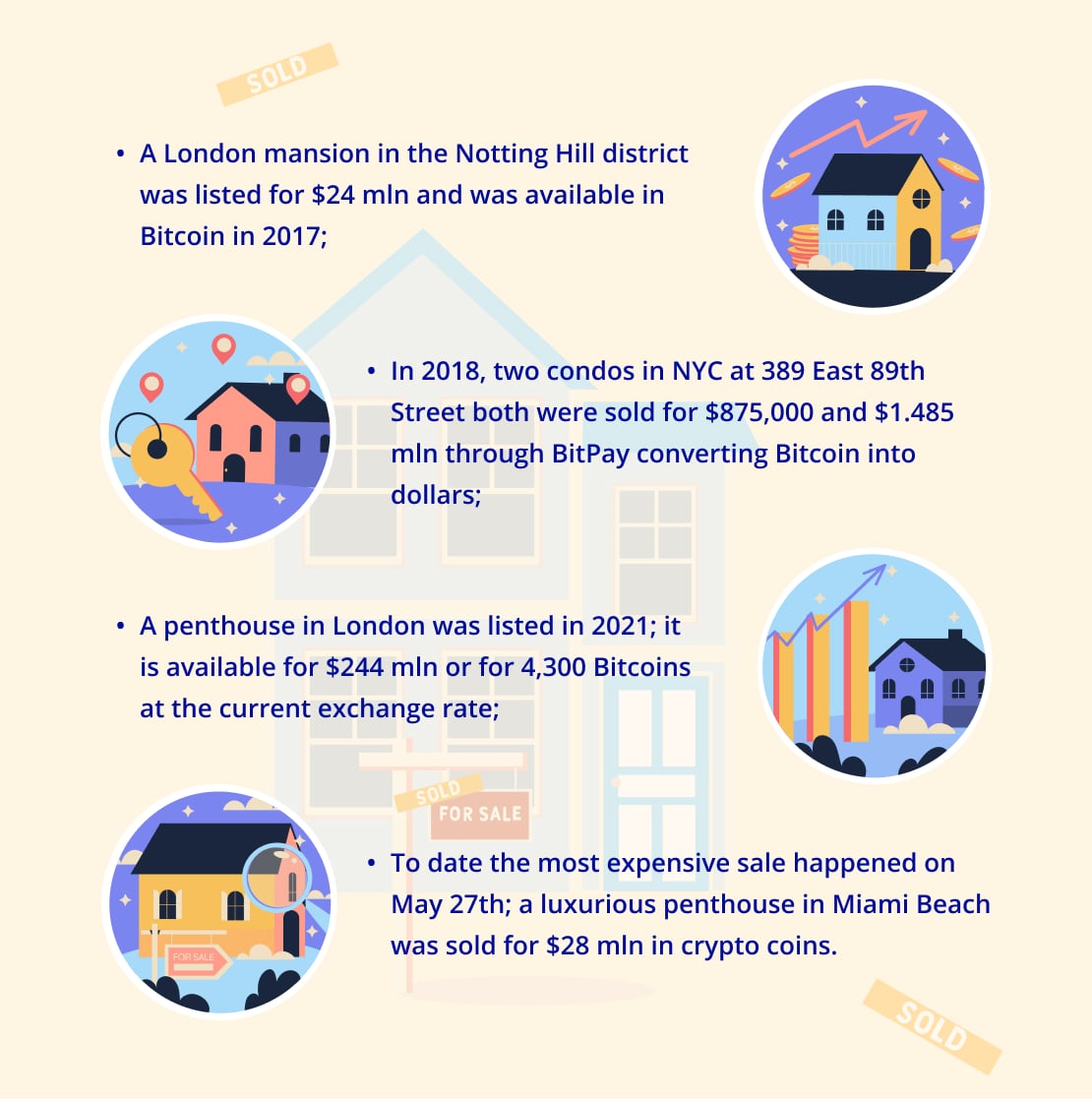The Future of Real Estate Transactions on The Blockchain Technology
Blockchain technology continues infiltrating diverse industries, opening up new opportunities for businesses. With blockchain, banks and financial institutions can quickly verify client identities, speed-up global transactions exchange, and better protect their data. Logistics businesses can improve the transparency of their supply chains. Governments successfully implement the technology for enhancing data exchange in the public sector. Even the energy industry started discovering how to utilize distributed ledgers to make their services better.
Real estate has also found many cases on how to gain an advantage from blockchain technology. In this article, we’ll look into the ways blockchain has a positive impact on the real estate sector and how the technology can improve real estate transactions.
Why Blockchain Is in Demand in Real Estate Market
Buying a house or a mansion using cryptocurrency is becoming a common practice today. Crypto traders were closing real estate deals starting from 2014, though they happened quite rarely back then. Since 2017 the news of selling expensive real estate began to appear more often in the press:

But why do more and more real estate buyers and sellers opt for crypto when trading property? There are several reasons for that – increased demand for decentralization in payments, speed of transactions, enhanced safety and fraud risk mitigation, greater transparency of property history and its status. All these parameters are simple to attain by implementing blockchain technology and Smart Contracts in the real estate industry. Let’s have a closer look at how Smart Contracts can be applied in this sphere, leveraging the potential of blockchains with smart contracts to revolutionize real estate transactions.
Ways Blockchain and Smart Contracts Have Changed Real Estate
Here are the ways how blockchain and Smart Contracts are disrupting the real estate industry.
Accessible Property Listing Services
Blockchain makes the real estate market more available for buyers and sellers. Traditionally, real estate has been sold through privately owned listings that connect buyers and sellers. Blockchain, in its turn, gives the opportunity to trade property on online trading platforms and marketplaces, supporting transactions in real-time and providing data to a wider audience.
To trade their real estate, sellers tokenize their property assets and sell them as stocks online. It means that they convert the property into tokens and can trade it as a single entity or in parts on a blockchain.
Elimination of Intermediaries
The property market has a complex ecosystem, consisting of broker, legal, financial, and other services. All of them require the participation of intermediaries that facilitate the property trading process, yet making it longer and much more expensive.
In its recent report on Blockchain in Commercial Real Estate, Deloitte states that blockchain and Smart Contracts will replace the intermediary roles and provide listing, payment, and legal document management services. As a result, buyers and sellers won’t have to pay commissions and fees to third parties, receiving consistent and fast service in one blockchain-based app or platform.
Liquidity
Traditionally, real estate is considered to be a low liquidity asset as it takes time for sales to conclude. With blockchain, sellers can significantly enhance the liquidity of their property.
Property tokens can be quickly exchanged to fiat currencies or traded in parts. Therefore, a seller doesn’t have to wait for the day when a buyer will be able to afford to purchase an entire house. Now, several buyers can invest in one building, sharing ownership with other investors. This way, parties can sell and buy assets much faster or obtain only fractions of tokens, carefully developing their investing strategies.
Transparency and Security
Blockchain creates a transparent and secure network accessible to everyone. This becomes possible as every participant owes a copy of an unchangeable transaction ledger where each transaction recording can be traced to its initiation. This way, the ledger contains all the property data buyers can access at any time. Moreover, the data is trackable in real-time, meaning that sellers and buyers can learn anytime at what stage of the deal they are and quickly verify the data, excluding any fraud or mistake.
How Does Blockchain Streamline Asset Management?
In the real estate sector, one of the major issues is to unambiguously determine the owner of the traded property. Blockchain uses programmable Smart Contracts and non-fungible tokens (NFT) for granting digital rights. Therefore, the technology has the full potential to change the way the real estate market operates.

Apart from defining property ownership, blockchain can impact the entire value chain of assent management, starting from client interaction to asset tracking and reporting. Here are the ways how it can be implemented for asset management:
- client onboarding – client onboarding can be a time-consuming process, especially when it comes to customer identification or KYC (Know your customer); blockchain can significantly alleviate the effort required for the KYC as it makes every transaction transparent and traceable for other participants of the network; as a result, the onboarding process can occur much quicker and smoother;
- trade settlement – using Smart Contracts sellers and buyers can ensure unbiased fulfillment of each condition included in the contract; this is achieved through the autonomy of Smart Contracts as neither of the parties can interfere with the contract execution process once the rules are settled and agreed upon;
- regulatory compliance – blockchain technology guarantees that Smart Contracts comply with the regulatory standards of a particular industry, location, or international laws; it provides a single source of credibility for blockchain participants and updates its base with the recent changes taken in the sphere; apart from the legal base, a distributed ledger can faster process the news and data that could influence the trades and traders’ decisions, providing them with the latest information on the underlying transactions.
Bottom Line
Blockchain is bringing radical changes to the real estate sector so that it’s becoming more open and accessible for a wider number of people. Now, even those buyers who can’t afford to purchase a house in one payment gain an opportunity to invest into their property in tokens. Meanwhile, the services related to real estate are becoming cheaper, more transparent, and secure.
The shift to the blockchain is happening rapidly and many of those companies that operate in the property sphere are already seeking blockchain development services to enhance their platforms with this innovation. Soon, real estate services empowered by decentralized ledgers will become a casual peer-to-peer activity performed on blockchain platforms doing most of the work swiftly and in one place.













